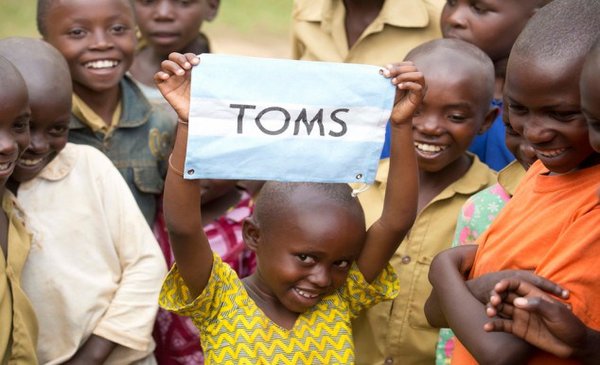
At a time when consumers continue to assume that brands will simply provide more, it may seem strange to suggest that brands should be more generous. And yet the case for brands delivering greater profits by bringing greater joy makes complete sense.
The concept of giving in order to receive was first raised here on Branding Strategy Insider several years ago. Reena Amos Dyes observed that as times become more difficult, people seek out care, empathy, sympathy and generosity. The writer suggested eight ways that organizations could do more to signal kindness and caring:
1. They could be more socially responsible, co-donating to causes that their customers also cared about;
2. They could make changes to their ways of working that actually boosted the environment instead of just limiting damage;
3. They could give things away;
4. They could help customers make better use of products;
5. They could offering new style perks that rewarded consumers in new ways;
6. They could offer more ways for customers to trial products before making purchase decisions;
7. They could engage in random acts of kindness; and
8. They could be warmer and more human in the ways they interact with people.
It’s a sign of just how quickly things change in marketing, and the extraordinary impacts of social media on customer interactions generally, that many of Dyes’ suggestions are now commonplace. In updating what the concept means today, Paige Lansing Valle has suggested that generosity is a powerful way of building bonds with consumers who now value authenticity and the contributions that brands are making to a better world.
Valle suggests that generosity today stems from purpose, uses social media to channel giving and creates a social halo where those that buy from brands that are seen as generous are in turn perceived as generous themselves. Furthermore, brands that engage in these ways to instigate change in the world take that push for change out into the world by building giving-communities that help people work together to achieve mutual goals.
There’s little doubt that social consciousness is emerging as a powerful purchase consideration factor, particularly among younger consumers. The challenge for brands today is to channel that commitment towards a better and more generous world without looking like they are taking advantage of shoppers’ idealism.
In a presentation to Retail’s Big Show earlier this year, Fitch Group’s Tim Greenhalgh pointed out that generosity encompasses more than giving away things. Generosity, he suggested, extends not just to things but also behaviors and experiences. Marketers’ earlier attempts at generosity were bait-and-switch. They talked to people’s love of a bargain, but what they lacked was the fundamental ability to move people emotionally. Today, experiences are the new currency of brands, and companies need to recognize that the generous provision of experiences is now elemental to brand building. What’s more, says Greenhalgh, brands that create experiences that customers judge to be extraordinary achieve financial returns that are more than double the market. Do this, he suggests, in four ways:
- Stand for something unique
- Deliver on your most important needs
- Have better digital services and truly engaging content
- Strive to make people’s lives better
For me, the take-away from these three viewpoints is that generosity is not something you get to judge and quantify as a brand. Generosity truly is in the eye of the receiver and in the community that the receiver is part of, because only they can decide whether what they are getting exceeds both what they expect and what others are prepared to give. And it’s not about largesse. The most generous doesn’t always win – especially if that gift is perceived to come with fish-hooks.
If you’re looking to infuse generosity into your brands in order to bring your customers closer, here are six ways to provide more in order to profit more:
1. Give your customers something to contribute to through buying from you. That contribution might be literal (like it is with TOMS) or it may be more abstract (in that it is linked to the support of an idea). Either way, it should deliver your customers a feel-good, do-good premium that uplifts them.
2. Bring customers together by instigating and supporting a community for good that enables people to celebrate what they are doing to change the world through your brand. That’s about more than having a Facebook page. It’s about proving real progress and engaging people to share what difference that progress is making for them.
3. Treat experiences as gifts rather than as gimmicks or promotions. Give because you want people to be happy through you – but, quid pro quo, tie your brand strongly to the distinctive emotion that the experience provides and appeal to that through your marketing. Too many marketers simply provide experiences that they haven’t linked back to their brand emotionally.
4. Meet a powerful need, powerfully and consistently. Too many brands pull on the heartstrings to attract interest, but then fail to carry that through into the long-term relationship. As a result, consumers feel they have met a brand that feels right to them, only to discover as they continue to interact, that the brand hasn’t translated that idea past that initial touchpoint.
5. Remind people of the difference you have made together. This isn’t about bragging or self-congratulations. It’s about quantifying what has happened in ways that consumers will react to with warmth and belief. Show how you are being a force for good in the world, and remind your customers that the more they do with you, the closer they get to a world they want to be part of.
6. Frame your generosity within commercial parameters. Brands that keep on giving simply change the expectations of their consumers, meaning generosity becomes the new everyday. To avoid this, understand where your business is going to be generous and how that will contribute to your bottom-line. But at the same time, know your limits.
Don’t Let The Future Leave Your Brand Behind. Join Us At The Un-Conference – Marketing’s Only Problem Solving Event. May 1st – 3rd, 2017 West Hollywood, California
The Blake Project Can Help: Accelerate Brand Growth Through Powerful Emotional Connections
Branding Strategy Insider is a service of The Blake Project: A strategic brand consultancy specializing in Brand Research, Brand Strategy, Brand Licensing and Brand Education
FREE Publications And Resources For Marketers

















